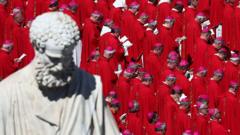In a week marked by intense anticipation, 133 Catholic cardinals are set to converge in the Sistine Chapel for one of the world’s most secretive elections: the selection of a new pope following the passing of Pope Francis. This exclusive gathering will take place under stringent conditions where confidentiality is paramount and breaches are met with serious consequences.
Every participant in the conclave, from the voting cardinals to the staff catering to their needs, is compelled to take an oath pledging "absolute and perpetual secrecy." This commitment extends not only to personal conduct but also to the implementation of extensive security protocols. The chapel and guesthouse locations have been meticulously checked for electronic devices, with various countermeasures, such as electronic jammers, ensuring no communication can seep in or out.
The lockdown environment is critical for preserving the sanctity of the election, with the hopes of preventing any form of external interference, including digital disruptions or personal influence. Participants will surrender all means of communication upon entry, including cell phones and smart devices, further isolating them from the outside world. According to John Allen, journalist for Crux, this high-security approach is driven by the principle of “trust but verify,” emphasizing the Vatican’s commitment to protecting the integrity of the process.
While confidentiality is observed during the conclave, it is a different story outside the walls of the Vatican. The weeks leading up to the conclave have ignited a media frenzy with journalists and spectators playing the role of "cardinal-hunters." Many prominent cardinals have been the subjects of speculation and scrutiny, as they interact in public, leading to numerous media reports aimed at deciphering potential alliances and preferences among them.
Visiting popular venues, cardinals are closely observed yet remain tight-lipped about the election process, contributing to a mystique that intrigues both the faithful and the secular observers alike. Meanwhile, internal dynamics within the Church are not devoid of preference and influence, as various factions attempt to sway the outcome in their favor.
Prominent cardinals are often accompanied by demands for certain values, and pressures swirl from both religious groups and public opinion. Notably, the rise of a new generation of cardinals, many appointed by Pope Francis himself, suggests that traditional lobbying efforts might be less impactful in this conclave, as newer members may not fully align with established agendas.
Regardless of outside pressures, it is believed that the cardinals will strive to focus on their spiritual mandate. As they enter into deliberations, the focus on unity and invoking the Holy Spirit’s guidance for this monumental decision remains strong. Ultimately, the chosen pope will not only influence the future direction of the Catholic Church but also hold sway over pressing global issues, making this a pivotal moment in both ecclesiastical and global contexts.
As the day of the conclave draws near, the world awaits to witness which candidate will emerge from the secrecy of the Sistine Chapel, ready to assume one of the highest religious offices in the world.




















